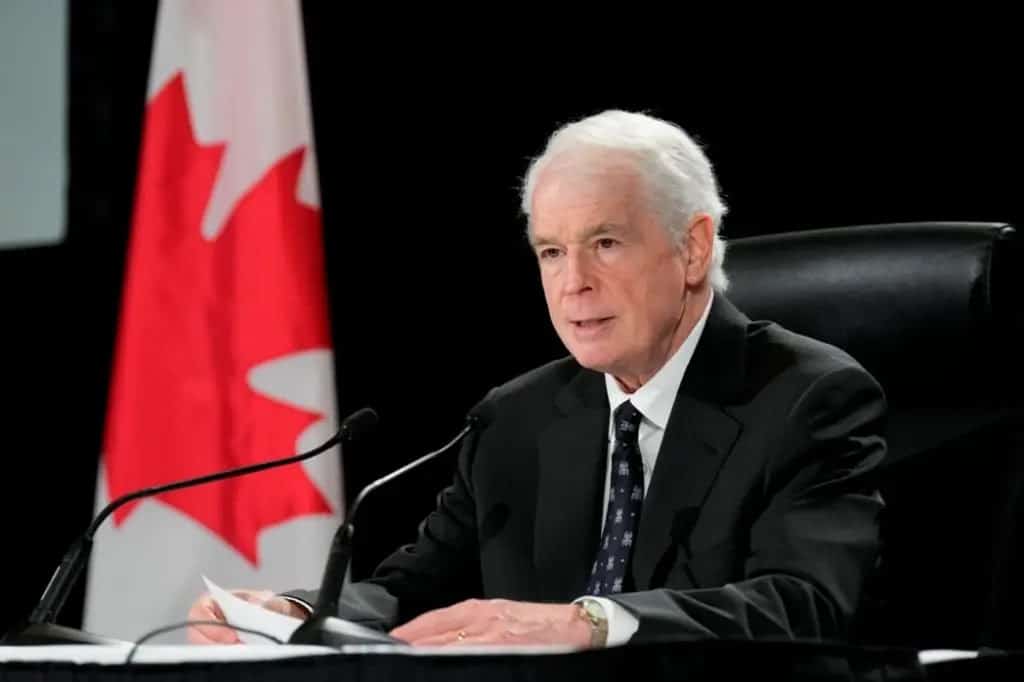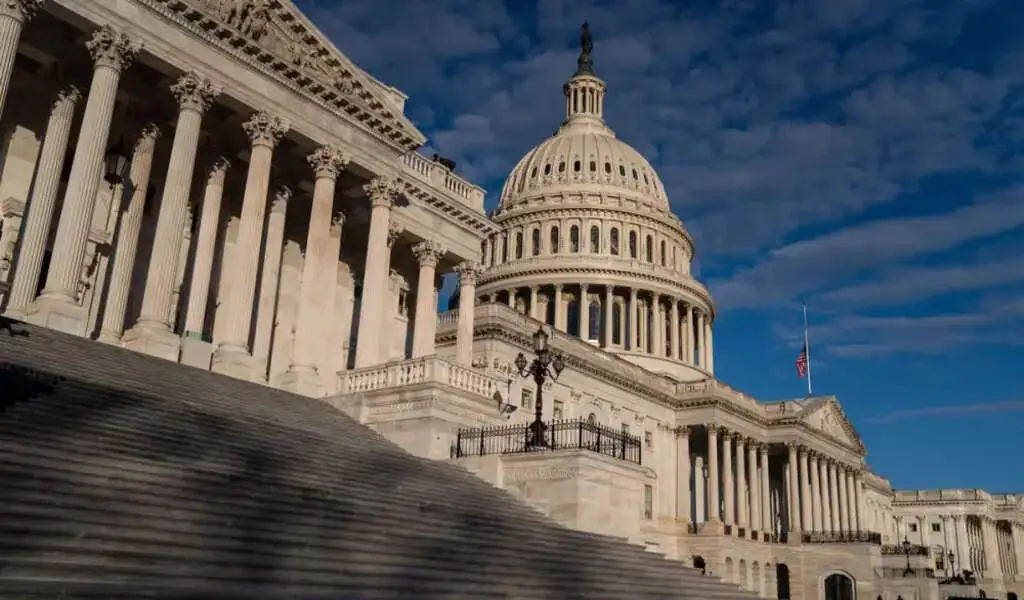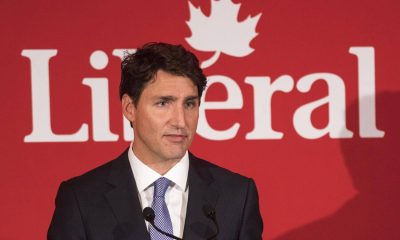News
Liberal Appointee Clears Justin Trudeau for Using Canada’s Emergency Powers Act

An inquiry led by a Liberal appointee has found that Justin Trudeau and the Canadian government met the “high” criterion by invoking the never-before-used emergency powers act to terminate trucker demonstrations last February.
Justice Paul Rouleau, a long-time Liberal supporter who led the examination into the usage of the 1988 Emergencies Act, called the decision a “drastic move” but not a “dictatorial one”. In times of crisis, the legislation gives the government new authority.
Prime Minister Justin Trudeau used it three weeks into the protests on February 14, 2022.
“Lawful protest deteriorated into lawlessness, resulting in a national emergency,” Mr. Rouleau said in his report to the Public Order Emergency Commission (POEC), which was tabled in the House of Commons on Friday.
Mr. Rouleau was a member of John Turner’s campaign for Liberal Party of Canada leadership when Pierre Trudeau announced his retirement. Rouleau then assisted in the selection of Turner’s cabinet after he was elected leader of the Liberal Party of Canada.
Justice Paul Rouleau, who has been with the Liberal Party for over 40 years, was appointed by Justin Trudeau to investigate Trudeau’s invocation of the Emergencies Act. Mr. Rouleau said he did not conclude lightly, but the federal government’s actions were “appropriate” and “effective”.
Though the report claims that emergency powers were required, it also claims that Prime Minister Trudeau inflamed the situation by calling the movement a “fringe minority,” reinforcing demonstrators’ resolve.
At a press conference on Friday afternoon, Prime Minister Trudeau stated that his administration will take the report’s recommendations seriously and that a response will be issued within the next year following an analysis.
He also agreed with the criticism of his remarks on the protesters, adding he wished he had said them differently.
The “Freedom Convoy,” a three-week-long demonstration against the government’s Covid-19 vaccine mandate, had gridlocked Canada’s national capital and received international attention.
Justin Trudeau used 1988 legislation, which empowered the government to impose prohibitions on public assembly in some locations and to bar travel to protest zones, including by foreign nationals, among other steps.
It also needs a formal investigation after the emergency action is invoked.
Late last year, the POEC heard from over 70 witnesses and 50 specialists. Judge Paul Rouleau of the Ontario Court of Appeal presided over the hearings.
On the final day of the hearings, Mr. Trudeau testified before the commission.
He defended his administration’s use of the act, claiming that law enforcement could not confront the protest in Ottawa and that he was afraid about what would happen if the government did not end it.
The measure authorized the federal authorities to evict and arrest protestors and freeze the financial assets of anyone involved in the protests.
Mr. Trudeau testified that he would not have utilized the powers if he thought another option existed.
“If I had been confident that other orders of government or any other law in Canada would have sufficed to deal with this emergency,” he stated, “we would not have met the threshold” to invoke the act.
In addition, the 2000-page report includes 56 recommendations to strengthen intelligence sharing, police reaction to large-scale protests, and the Emergencies Act itself.
The Emergencies Act was enacted in 1988 but has never been used. The law was explored in the early stages of the epidemic under public welfare but was ultimately deemed superfluous.
The antecedent law, known as the War Measures Act, was utilized three times in Canadian history: during the First World War, the Second World War, and, most controversially, during the October Crisis by Pierre Trudeau, Justin Trudeau’s father.
Meanwhile, Justin Trudeau expresses sorrow for describing Freedom Convoy demonstrators as a ‘fringe minority’. Trudeau claimed he spoke too broadly about demonstrators, many of whom wanted to be heard in their opposition to two years of pandemic restrictions.
“I wish I had framed things differently,” Trudeau said at a press conference on Friday.
Trudeau claimed he was speaking too broadly about protestors, many of whom, he said, merely wanted to make their opinions heard in opposition to the government’s pandemic restrictions imposed for two years.
Trudeau admitted that he could have been more precise about a tiny group of people with anti-vaccine attitudes that he believed were causing harm.
“The truth is that there are a very small number of people in this nation who purposefully promote misinformation and deception that has resulted in Canadian fatalities and extreme hardship in others who trust them,” he stated. “But, that is a small subset of folks who were simply hurting, worried, and wanted to be heard.”
Conservative leader Pierre Poilievre accused Trudeau of being the main source of division in Canada at a second press conference held shortly after Trudeau’s.
“He intends to divide and conquer. “He believes that if he can divide Canadians against one another, they will forget how horrible life has become,” Poilievre explained.
“He thinks that if you’re terrified of your neighbor, you’ll forget that you can’t pay your rent. If you’re terrified of a trucker, you might forget you’re hungry and divert your gaze away from the person who caused the situation in the first place.”
News
Man Creates Candy Cane Car to Spread Christmas Cheer

In a delightful display of holiday spirit, a local resident in North Providence, Maine, has transformed his vehicle into a candy cane delight that is capturing hearts and spreading Christmas Cheer.
Over the past 15 years, Dave Clayman has transformed a simple 1991 Toyota Camry into a rolling holiday icon that captivates everyone who encounters it.
It’s wrapped in $3,000 worth of reflective tape, the same kind used on trailer trucks. Whether parked at a mall or cruising down the highway, you can’t miss it with its candy cane decorations.
This whimsical project started with an unusual idea. When an old exercise bike landed in Clayman’s possession, he mounted it on top of his car instead of letting it gather dust in his garage.
“There’s nothing like working out in the fresh air,” Dave said. That quirky addition quickly drew eyes, inspiring him to keep going.
The car features homemade rockets built from trash cans and salad bowls, candy cane-themed hubcaps, and candy cane lights dangling from the mounted exercise bike.
The Candy Cane Car cost Clayman $3,000
To top it off, it boasts a PA system and a custom horn, making it a true sensory experience.
The candy cane car has now become a local landmark every Christmas. Parked outside Clayman’s house, it’s a favourite backdrop for people snapping photos or simply stopping to admire it.
Some visitors even share stories of seeing the car as a child, reminiscing about how it’s been a beloved part of their neighbourhood for years.
“When people see it, their mood amplifies,” Clayman explained. “If they’re happy, they become happier. If they’re upset, well, they sometimes get angrier.” But for the most part, he estimates that over 96% of people love the festive car, particularly around Christmas.
Clayman said he used to wear a Santa costume when riding in his festive car for years. A few years ago, he bought a Grinch costume and never looked back.
“It’s like a state of euphoria. Every time I get behind the wheel and people see it,” he said. “Anything that people are in a better mood, it seems to make you in a better mood. It’s a labor of love you got to be committed to it.”
Related News:
Costco Is Offering The Peloton Bike+ At 300 Locations This Holiday Season.
News
Senate Approves Social Security Fairness Act, Heads to Final Vote

(VOR News) – On Wednesday, the United States Senate Social Security passed a measure with a vote of 73-27, indicating that the legislation, which is co-sponsored by Senator Susan Collins of Maine, is likely to be implemented before the end of the year.
The law may be beneficial to personnel working in the public sector in Maine, including teachers, firefighters, and other workers.
The Social Security Fairness Act would repeal two restrictions that lower the amount of Social Security payments paid to public employees.
These regulations would be eliminated with the passage of the act. A provision known as the Windfall Elimination Provision makes it impossible for public employees who are currently receiving pensions to continue receiving them.
The Government Pension Offset, as it is commonly referred to, is designed to limit the amount of money that can be paid to the surviving spouses of recipients who are also receiving government pensions.
This problematic situation impacts Social Security benefits.”
In November 2024, the Social Security Administration reported that more than 2 million individuals, including more than 20,000 in the state of Maine, had their Social Security benefits reduced as a result of the Windfall Elimination Provision,” Collins stated in a statement that was released by her department.
In November 2024, the Government Pension Offset had an impact on more than 650,000 individuals, with more than 6,000 of those individuals residing in the state of Maine, according to the previously mentioned line of reasoning.
A vote of 327 to 75 was necessary for the measure to be approved by the House of Representatives the previous month. On Wednesday, Chuck Schumer, the Democratic leader of the Senate, announced that he intended to work rapidly in order to deliver the act from the House of Representatives to the president’s desk.
As indicated by Schumer, who was speaking on the floor of the United States Senate today, “Passing this Social Security fix right before Christmas would be a great gift for our retired firefighters, police officers, postal workers, teachers, and others who have contributed to Social Security for years but are now being penalised because of their time spent serving the public.”
In the beginning, the measure was supported by two individuals: Sherrod Brown, a Democrat from Ohio, and Collins, a Republican. During her speech in support of the proposal, which was made on the floor of the Senate on Wednesday afternoon, Collins stated that the idea will have a significant impact on a number of individuals, including teachers in the state of Maine.
These advantages are the direct result of the effort that they put forth. During the course of her remarks, Collins asserted that the punishment in question was both unreasonable and unacceptable.
This will strain Social Security’s already shaky budget.
In a recent examination, it was discovered that the Windfall Elimination Provision was one of the primary problems that contributed to the difficulties that the teacher workforce in Maine is experiencing, which experts are referring to as a crisis.
A poll that was conducted and released by the non-profit organisation Educate Maine found that teachers in each and every county in the state of Maine identified the provision as a hindering factor in the process of recruiting new teachers.
According to the findings of the study, “this federal policy that reduces social security payouts is a disincentive,” which implies that it is detrimental to teachers who take on additional work and discourages people from switching careers in order to become teachers.
Sharon Gallant, a retired educator who worked in Gardiner for a total of 31 years, is one of the educators that are now employed there. Prior to beginning his career as a teacher in the public school system, Gallant was employed in the business sector. He made a little contribution to the Social Security system during the entirety of this time period.
“When you move into public education, you are faced with a certain degree of punishment,” according to her statement.
In letters that Gallant sent to Collins and to Sen. Angus King of Maine, who is an independent, he urged both of them to support the concept. She stated that even if it is unsuccessful, Maine will still have a difficult time recruiting teachers because of the clause that deters them from employment.
She made the observation, “If this does not pass, then it is just another reason not to enter public service.”
SOURCE: FR
SEE ALSO:
The Federal Reserve Will Drop Key Rates, But Consumers May Not Gain Immediately.
Canadian Dollar Hits Multi-Year Low Over Political Unrest
News
The Federal Reserve Will Drop Key Rates, But Consumers May Not Gain Immediately.

(VOR News) – If the Federal Reserve indicates on Wednesday that interest rate reductions will proceed more gradually next year than in recent months, the United States may experience only slight alleviation from the persistently elevated costs of borrowing for credit cards, auto loans, and mortgages.
The Federal Reserve is set to announce a quarter-point reduction in its benchmark rate, anticipated to decrease from around 4.6% to approximately 4.3%.
This represents the latest action undertaken, subsequent to a quarter-point cut in interest rates in November and a larger-than-usual half-point reduction in September.
The Wednesday meeting may mark a new era for the Federal Reserve.
The Federal Reserve is more inclined to adjust its monetary policy at alternate meetings, rather than at each meeting. The central bank policymakers may announce that they now expect to reduce their primary rate only two or three times in 2025, instead of the four reductions previously planned three months ago.
The Federal Reserve has utilised the rationale of a “recalibration” of ultra-high interest rates, originally aimed at curbing inflation that peaked at a four-decade high in 2022, to defend its measures thus far.
A considerable number of Federal Reserve officials contend that interest rates should not remain as elevated as they currently are, given the substantial decline in inflation. The Federal Reserve’s chosen index shows that inflation was 2.3% in October, a notable decline from the peak of 7.2% in June 2022.
Conversely, despite the swift economic growth, inflation has consistently exceeded the Federal Reserve’s 2% target for several months. The monthly retail sales statistics released by the government on Tuesday reveals that Americans, especially those with higher incomes, are inclined to spend liberally.
These trends, as per the views of several economists, suggest that further rate decreases could unduly stimulate the economy, perhaps leading to sustained high inflation.
The incoming president, Donald Trump, has advocated reducing taxes on overtime income, tips, and Social Security benefits, along with diminishing regulations in these domains.
When combined, these Federal Reserve practices can advance progress.
Alongside the threat of imposing various tariffs, President Trump has pledged to execute extensive deportations of migrants, both of which could exacerbate inflation.
Chair Jerome Powell and other Federal Reserve officials have indicated that they cannot assess the potential effects of President-elect Trump’s policies on the economy or their own interest rate decisions until further information is available and the likelihood of the proposed initiatives being enacted becomes clearer.
Consequently, the result of the presidential election has predominantly led to heightened economic uncertainty up to that point.
It seems improbable that the United States would soon experience the advantages of significantly reduced loan interest rates. As of last week, the average rate for a 30-year mortgage was 6.6%, lower than the top rate of 7.8% recorded in October 2023, according to Freddie Mac.
It is quite unlikely that mortgage rates of approximately three percent, which were common for nearly a decade prior to the onset of the pandemic, would be restored in the foreseeable future.
Federal Reserve officials have indicated a deceleration in interest rate reductions as the benchmark rate nears what policymakers designate as a “neutral” rate, a one that provides neither advantages nor disadvantages to the economy.
During a recent meeting, Powell stated, “Inflation is slightly elevated, and growth is unequivocally stronger than we anticipated.” Nevertheless, the positive aspect is that we can afford to use greater caution while we persist in our pursuit of neutrality.
Most other central banks globally are likewise lowering their benchmark interest rates. This week, the European Central Bank lowered its benchmark interest rate for the fourth time this year, from 3.25% to 3%.
This action was taken in reaction to the decline of inflation in the 20 euro-using countries, which has fallen to 2.3% from a peak of 10.6% in late 2022.
SOURCE: AP
SEE ALSO:
Liberal MPs Call on Trudeau to Resign
ABC Gives Donald Trump’s Presidential Library $15 Million To Settle a Defamation Dispute.
-
Politics3 weeks ago
Miller Expects 4.9 Million Foreigners to Leave Canada Voluntarily
-
News3 weeks ago
Nolinor Boeing 737 Crash Lands in Montreal
-
News2 weeks ago
“Shocking Video” Vancouver Police Shoot Armed Suspect 10 Times
-
Tech3 weeks ago
Increasing its Stake in OpenAI by $1.5 Billion is a Possibility for SoftBank.
-
News4 weeks ago
Facebook Securities Fraud Case Dropped
-
Health4 weeks ago
A Canadian Teenager’s Bird Flu Virus Has Mutations































